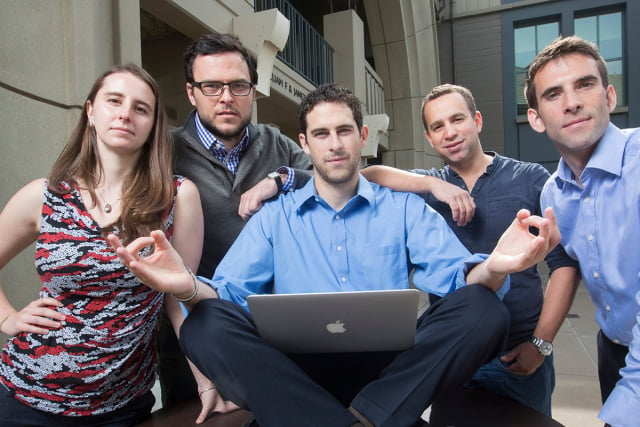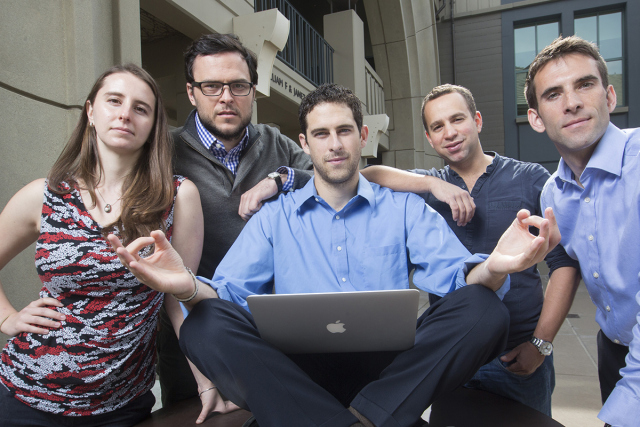 Haas Data Science Club leaders Claire Bianchi, Antoine Bruyns, Scott Crider, Samy Merzgui, and Pete Dillon, all MBA 16.
Haas Data Science Club leaders Claire Bianchi, Antoine Bruyns, Scott Crider, Samy Merzgui, and Pete Dillon, all MBA 16.By Kim Girard
When Antoine Bruyns, MBA 16, arrived at Haas last year, he was already addicted to the power of Big Data.
A native of Belgium, Bruyns and several friends had started a mobile data-crunching company in Tanzania in 2010. The company, Real Impact Analytics, has since grown to 70 employees and recently helped track the spread of the Ebola virus using anonymous data.
But the draw of Silicon Valley’s entrepreneurial culture led Bruyns to leave the growing startup for Haas.
“The way I see it, Silicon Valley is like Italy during the Renaissance,” he says. “It’s like being among the Medicis, among all of these great minds. That’s why I came.”
In Berkeley, Bruyns immediately jumped into his passion. He connected with the Berkeley Institute for Data Sciences (BIDS), a five-year, $38 million collaborative effort established to promote data-driven scientific breakthroughs, and to the AMP lab, which focuses on the intersection of three trends: machine learning, cloud computing, and crowdsourcing.
Bruyns found kindred spirits among his classmates, and joined forces to increase Haas students' access to Berkeley's top-flight data science resources. He and fellow MBA 16 students Scott Crider and Samy Merzgui co-founded the Haas Data Science Club last fall, as a spin-off of the Haas Technology Club. Classmates Claire Bianchi, Pete Dillon, Dale Alejandro Robinson, and Peter Jordan joined soon after the first meeting, and the group enlisted Assist. Prof. Tom Lee as their faculty advisor.
"You're at the mercy of others if you dont understand data."
- Claire Bianchi, MBA 16
In tandem with the students' work, Prof. Greg LaBlanc says the MBA curriculum is changing to reflect industry changes. Data analysis has become much more sophisticated since he began teaching his Data and Decisions course five years ago with Assoc. Prof. Lucas Davis.
“We realized that business was being transformed through data-driven decision making, and companies were engaging in experimentation—moving away from decision by gut,” he says. “So we reconfigured the class to be more about understanding data and inference and not just about statistics.”
This quarter he’s introducing a new course, Data Science/Data Strategy, centered on how big companies build strategies around data, and exploring data science techniques and business models built around data. The class is already full, with 60 full-time and 60 part-time MBA students enrolled.
Two years ago, Asst. Professsor Minjung Park also launched a Marketing Analytics course, which focuses on understanding and using Big Data in marketing.
In addition, LaBlanc is working with Data Science Club members to organize a speaker series this fall, inviting executives from Wells Fargo, IBM, Facebook, and Walmart to discuss how they use data in business. The goal is to give students the tools they need so they can leave Haas with the confidence to immerse themselves in a data project.
“When they walk into a meeting with a team of engineers they can’t come in cold,” he says. “They have to bring something to the table.”
The Data Club, which is open to IT, engineering and business majors, is also organizing technical workshops run by companies that show students how to use different data tools.
Big Data can be difficult for business majors who lack a technical background, but Bruyns says he knew they were on to something when more than 60 people showed up for an data visualization event last fall with Tableau software.
Bianchi, MBA 16, says the club was exactly what she wanted as part of in her MBA program. She has worked as a senior database marketing analyst at Hotwire and as a manager of customer relationship management at UniversityNow. Those experiences taught her that deep-data knowledge is crucial for any MBA working with engineers, analytics experts, or business intelligence managers.
“You're at the mercy (of others) if you don’t understand data,” she says. “At Hotwire, the people who didn’t have that background struggled. They might think that the data someone pulled for them was pulled incorrectly, but they don’t understand why and they’re not able to have a conversation with that person.”




